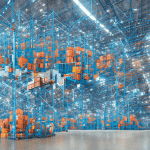In recent years, we’ve seen a seismic shift in the food industry. Modern consumers are increasingly interested in the safety and sustainability of their food sources. This isn’t just about the health benefits of organic or free-range products. It’s about knowing where our food comes from and how it got to us. In other words, we’re talking about the traceability of food products. An emerging technology that may play a significant role in this sphere is the blockchain. Let’s delve into this fascinating conversation about food, supply chains, and technology.
Implementing Blockchain in the Food Supply Chain
The word ‘blockchain’ is closely associated with cryptocurrencies such as Bitcoin. But what does it have to do with the food supply chain? Well, let’s break it down.
A lire aussi : Can You Create a Luxurious Dining Experience with Simple Seafood Dishes?
A blockchain is essentially a decentralized ledger, records are chained together, and any changes to these records are reflected across the entire network. This transparent and tamper-proof system could be the solution to enhancing traceability in the food supply chain.
Imagine a system where every stage of a product’s journey, from farm to fork, could be logged securely and immutably on a blockchain. It would empower both businesses and consumers with accurate data about products, promoting transparency, and building trust.
Sujet a lire : How Can You Style Combat Boots for a Feminine Look?
Several trailblazing companies have begun implementing blockchain-based systems to track their products. It’s fascinating to see technology being utilized for such a crucial cause. But, how exactly does it work? Let’s explore that next.
The Nuts and Bolts of Blockchain-based Traceability Systems
To truly understand the potential of this technology, it’s essential to comprehend how it works. Once you do, you’ll start to see why it’s such a game-changer for food traceability.
When a product is harvested, it is assigned a digital tag with a unique identifier. This tag is then logged onto the blockchain. As the product moves through the supply chain – from transport to processing to the retail shelf – each transfer of custody is logged as a transaction on the blockchain. These transactions form a chain of events that can be traced back to the origin, hence the term ‘blockchain’.
The beauty of this system is that, because the blockchain is decentralized, it’s nearly impossible to tamper with the data. Any attempts to alter the information are visible to all participants in the network.
Now, this might sound like something out of a sci-fi novel, but it’s already happening. Big names in the industry, including food and beverage giant Nestle and tech titan IBM, have launched successful pilot projects utilizing blockchain technology for food traceability. But what does this mean for you as a consumer?
Empowering Consumers Through Transparent Data
In an era where information is king, data is the key to empowering consumers. The advent of blockchain technologies in the food industry can provide you with precise information about your food products.
Interest in sustainable, ethically sourced food products is at an all-time high. You want to know where your food comes from, how it was produced, and whether it complies with your ethical and environmental values. Blockchain can provide this information in a transparent and reliable manner.
By scanning a QR code or similar identifier on a food product, you could access a complete history of that product – when and where it was harvested, how it was processed, how long it took to reach the supermarket, and so on. This is the kind of transparency that can help you make informed decisions about the food you eat.
The Role of Big Tech Companies in Promoting Blockchain Technology
The entry of major tech companies like IBM and Google into the blockchain space has significantly accelerated the adoption of this technology. Google, for instance, has invested in blockchain startups and launched a suite of blockchain services. IBM, on the other hand, has a division dedicated to blockchain solutions, including a food traceability project known as IBM Food Trust.
The involvement of such industry heavyweights is a strong indication of the potential of blockchain technology in the food industry. Their resources, expertise, and clout can drive innovation, forge partnerships, and promote standardization, thus paving the way for widespread adoption.
As we progress further into this digital age, the integration of technology into the food supply chain looks increasingly inevitable. Blockchain may well be the key to a future where food sources are traceable, transparent, and trustworthy. As consumers, this can only be good news. The more we know about our food, the better choices we can make for our health and our planet.
Overcoming Challenges and Realizing the Potential of Blockchain
Despite the potential benefits of blockchain, there are still several challenges to overcome before realizing its full potential in the food sector. One of the driving factors behind these challenges is that the technology is still relatively new, and many industry players are still uncertain about how to implement it effectively.
One of the key challenges is the lack of standardization. While tech giants like IBM and Google are promoting their blockchain solutions, there is no universally accepted standard for blockchain technology in the food industry. This lack of standardization can lead to compatibility issues, creating hurdles for companies looking to implement blockchain.
Another hindrance is the high cost of implementing a blockchain-based system. As a new technology, the costs associated with its implementation can be high. This can deter small and medium-sized food producers from adopting blockchain, despite the potential benefits.
Finally, there’s the issue of data privacy. While blockchain is praised for its transparency, the technology also raises questions about who can access the data and how it is used. Striking a balance between transparency and privacy is, therefore, a critical challenge to address.
However, these challenges are not insurmountable. With continued research, collaboration, and innovation, the food industry can overcome these hurdles and unlock the full potential of blockchain technology.
Conclusion: A Future of Sustainable and Traceable Food
The integration of blockchain technology into the food industry is undoubtedly a game-changer. It has the potential to revolutionize the way we perceive food traceability and sustainability. The prospect of having access to transparent, trustworthy data about our food sources isn’t just appealing – it’s empowering.
The journey towards a blockchain-enabled food industry might be challenging and filled with hurdles, but the potential benefits are worth the effort. The implementation of blockchain technology in the food sector can provide unparalleled traceability, enhance consumer trust, and promote sustainable practices.
Big tech companies have already taken the lead, and it’s only a matter of time before more food companies follow suit. As the technology matures and becomes more accessible, we can look forward to a future where our food sources are not just sustainable, but also easily traceable.
In the end, the technology’s role doesn’t just stop at enhancing the traceability of sustainable food sources. It pushes us to think beyond our traditional understanding of the food supply chain. It encourages us to imagine a world where consumers are truly informed and empowered to make sustainable choices. Today, as we step further into the digital age, that world seems more attainable than ever.










